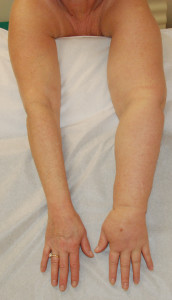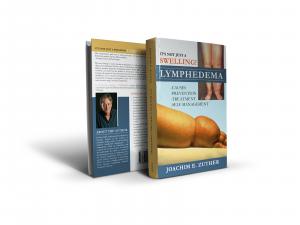A Must Have for all affected by Lymphedema, Lipedema and related diseases. This new book focusing on the Self-Management of Lymphedema is specifically geared toward the patient, caregivers, and family members.

Lymphedema of the arm
How to effectively self-manage Lymphedema and Lipedema
— Joachim Zuther, Lymphedema Specialist
GRANT-VALKARIA, FL, UNITED STATES, December 18, 2023 /EINPresswire.com/ — Lymphedema is very common and serious condition that affects millions of individuals. While there is no consistency in the data of the overall incidence of lymphedema in the United States, it is estimated that at least 3 million Americans are affected by this condition.
Lymphedema is classified as either primary or secondary. Primary lymphedema is caused by congenital malformations of the lymphatic system and usually affects the lower extremities. It may be present at birth, but more often develops later in life, often in puberty or during pregnancy.
Secondary lymphedema is much more common; most patients in the western hemisphere develop lymphedema after surgery and/or radiation therapy for various cancers (breast, uterus, prostate, bladder, lymphoma, and melanoma). Other patients develop lymphedema after trauma or deep vein thrombosis. In certain countries, parasites (filariasis) account for millions of cases of lymphedema. Its cosmetic deformities are difficult to hide, and complications, such as fibrosis, cellulitis, lymphangitis, lymphorrhea, etc. do occur frequently. Lymphedema may be present in the extremities, trunk, head and neck, abdomen, the external genitalia as well as in inner organs; its onset is gradual in some patients and sudden in others.
Nutritional Aspects in Lymphedema:
There is no special diet for lymphedema. An accepted nutritional approach in the management of lymphedema is to follow a balanced diet, which in addition to physical activity and exercises promotes weight loss. Excessive weight contributes to greater demands on the lymphatic systems ability to drain fluid from the tissues; weight control therefore positively affects lymphedema.
A balanced healthy diet including whole grains, fish, fruits and vegetables and avoiding fatty foods will greatly assist in achieving and maintaining a healthy weight without restricting the intake of important nutrients and vitamins. Crash diets or diets which restrict certain food groups and nutrients are not advisable.
In the book “It’s Not Just a Swelling! – Lymphedema“, which is geared toward the patient, their family members and caregivers, important nutritional information, as well as all aspects of proper and effective management of Lymphedema and related conditions are covered. Included are detailed descriptions of treatment techniques used by certified lymphedema therapists, as well as other important techniques of self-management, such as the use of compression pumps and garments, and exercises.
The book is available on Amazon as paperback, hardcover and e-book. The book is also available on Lulu.
There is a common misconception that lymphedema may be positively affected by limiting the protein intake. This is not the case – although lymphedema is defined as an accumulation of water and protein in the tissues, it is essential to understand that lymphedema cannot be reduced by the limitation of protein ingestion, which can even be potentially dangerous. It is also important not to limit fluid intake in an attempt to reduce the swelling. Good hydration (water) is essential for basic cell function and especially important before and after lymphedema treatment to assist the body in eliminating waste products.
About The Author Joachim Zuther, world-renowned Lymphedema Specialist, Founder of the Academy of Lymphatic Studies, author of the bestselling textbook Lymphedema Management – A comprehensive Guide for Practitioners, and co-author of numerous chapters in textbooks for Lymphedema. Mr. Zuther is a member of the International Society of Lymphology (ISL), the National Lymphedema Network (NLN), and the German Association of Lymphology (DGL). He is also a founding member of the North American Lymphedema Education Association (NALEA).
Joachim Ernst Zuther
Lymphedema Blog
+1 772-913-1027
email us here
Visit us on social media:
Facebook
LinkedIn
Instagram
YouTube
Joachim Zuther, Lymphedema Specialist, talks about the difference between edema and lymphedema
![]()
Originally published at https://www.einpresswire.com/article/674921282/dietary-considerations-for-lymphedema
The post Dietary Considerations for Lymphedema first appeared on Beauty Ring Magazine.
Beauty - Beauty Ring Magazine originally published at Beauty - Beauty Ring Magazine





